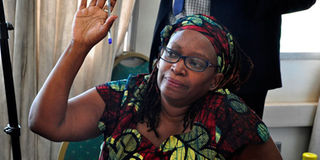Activists ask Parliament to drop electroconvulsive therapy from Mental Health Bill

Stella Nyanzi makes a submission to the committee. PHOTO BY MOSES KYEYUNE
What you need to know:
- Electroconvulsive therapy (ECT) is a medical treatment for severe mental illness in which a small, carefully controlled amount of electricity is introduced into the brain.
- In its present state, the "Mental Treatment Act" enacted in 1964 violates human rights of persons with psychological and intellectual disabilities.
- Dr Nyanzi last year used social media to criticize government failures and referred to President Museveni as "a pair of buttocks".
The Initiative for Social and Economic Rights (ISER), a Non-Government Organisation advocating for “the adoption and use of human rights” healthcare wants Parliament to drop electroconvulsive therapy used on mental health patients.
The activists on Thursday appeared before Parliament’s Committee on Health to give their views on the Mental Health Bill, 2014 that is currently being processed.
According to ISER Program Officer Cynthia Nona Tamale, electroconvulsive therapy is an outdated method which has been condemned by world, including African states.
"The justification of protection, safety and wellbeing of the patient and other persons is too wide to warrant this practice which has been condemned worldwide for inflicting pain on persons with mental illness," said Ms Tamale.
“The Bill should adopt the stand taken by other African countries such as Kenya on electroconvulsive therapy for involuntary and emergency admission where consent of the patient has not been obtained,” she added.
Electroconvulsive therapy (ECT) is a medical treatment for severe mental illness in which a small, carefully controlled amount of electricity is introduced into the brain.
This electrical stimulation, according to medical experts, is used in conjunction with anesthesia (a pain cooling substance) and muscle relaxant medications to produce a mild generalized seizure.
Whereas it is used to treat a variety of psychiatric disorders, it is most effective in the treatment of severe depression and provides the most rapid relief currently available for mental illnesses.
The NGO argued that this therapy is a violation of people’s rights and must be abandoned.
ISER is also opposed to the use of seclusion and mechanical bodily restraint for patients with mental illnesses.
“There should be clear and defined instances in the Bill when a patient will be subjected to seclusion and restraint,” Ms Tamale argued.
She added that in Kenya restraint and seclusion can only be used when it is the only means available to prevent immediate or eminent harm to the patient.
ISER also expressed concern over the routine forced medical interventions without the consent of the patients.
Ms Allana Kembabazi, the organisation’s program manager told the committee chaired by Kiryandongo Woman MP Hellen Kahunde (NRM) that in its present state, the "Mental Treatment Act" enacted in 1964 violates human rights of persons with psychological and intellectual disabilities.
These, she said, often find themselves in detention centres and forced rehabilitation facilities thus backing the new legislation.
"The Bill is a welcome and timely initiative with instrumental reforms to mental health law," she said.
They urged the committee to strengthen the protection of vulnerable groups including women, children and older persons and also improve the living conditions of facilities for mental health patients.
"The Bill does not provide for the minimum living conditions which should exist at a mental health facility which should ensure it is as close as possible to a normal life of persons of their age," said Ms Kembabazi.
She cited the "Kenya Mental Health" law which provides for recreation and leisure activities, facilities for education and religious practice as well as communication, vocational rehabilitation and other measures that promote reintegration of the person in the community.
They emphasized the need for consent and withdrawal of consent saying that it is integral to individual autonomy and dignity.
Ms Kahunde said that the submissions were enriching and would form part of the final recommendations to Parliament.
On Wednesday, the same committee interacted with Dr Stella Nyanzi who recently contested a move by government to forcefully subject her to a mental test.
Dr Nyanzi last year used social media to criticize government failures and referred to President Museveni as "a pair of buttocks".
The Mental Health Bill, 2014 seeks to amend the existing law, to cater for present day challenges of persons suffering from mental illnesses.




